
The 2025 Bundestag Election and Its Consequences
2024 turned out to be one of the most dramatic years in German politics for several decades. After years of policy and budgetary tensions, internal machinations, and record-low public approval, the traffic light coalition of SPD, Greens, and FDP led by Chancellor Olaf Scholz fell apart in early November 2024. The next chancellor and governing coalition will have an impact on the future of Germany, Europe, and the transatlantic relationship—as will Germany’s disruptive populist forces gaining strength in the polls.
Project Description
An unsuccessful vote of confidence on December 16th paved the way for new elections (seven months early) scheduled for February 23, 2025. If the polls hold, the center-right and radical right will be strengthened and a new coalition led by Friedrich Merz and the CDU/CSU will be in place later in the spring. But the swirling crises—poor economic performance, an increasingly hostile international environment with ongoing hostilities in Ukraine and the return of Donald Trump in the United States, and persistent challenges with public underinvestment, migration, and structural economic change—will not go away.
“The 2025 Bundestag Election and Its Consequences” explores the current tumult in German politics. Why was the traffic light coalition unable to implement its agenda or effectively respond to mounting crises? How could they not overcome internal differences and let early elections—in which all the governing parties will be punished—happen? What does the likely rightward shift in the electorate and renewed CDU-led governance portend? What are the issues and concerns motivating voters? Who are the politicians beyond Friedrich Merz who will impact policy and governance over the next four years? Green Robert Habeck? Liberal Christian Lindner? Scholz? Or will AfD figures like Alice Weidel or Björn Höcke come to the fore? And what does the continued strengthening of right-wing (AfD) and left-wing (Alliance Sahra Wagenknecht, BSW) populism mean for Germany’s future?



